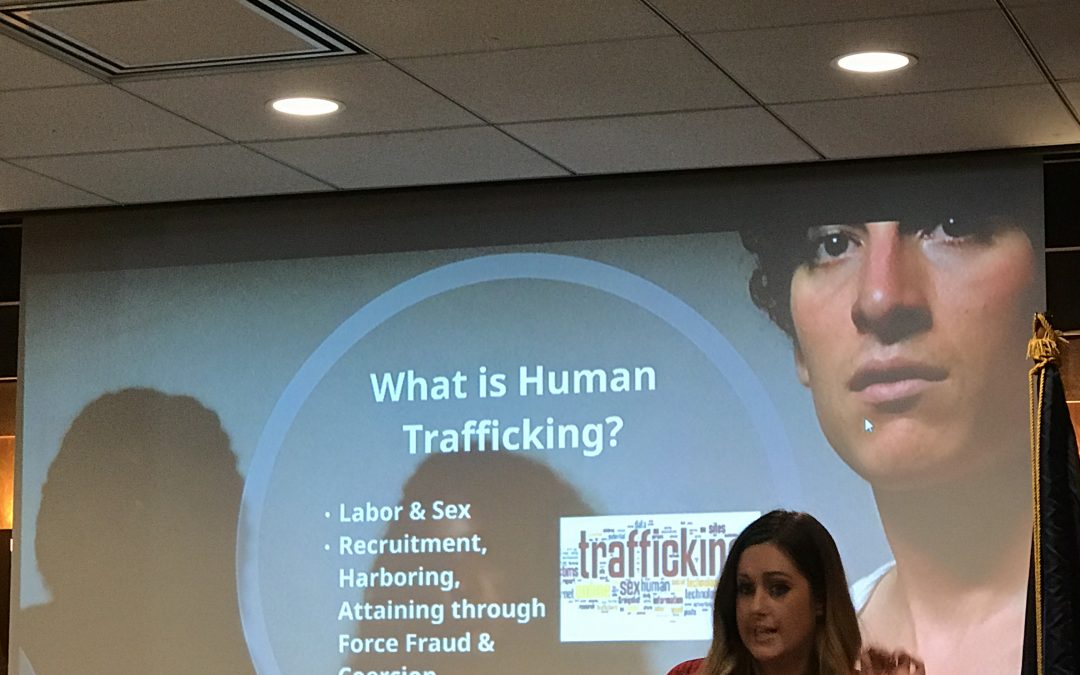by Ingrid Nova | Jul 17, 2017 | Uncategorized
 District Governor Teresa Brandell shares a Rotary theme banner with East Lansing Rotary Club President Ody Norkin during her visit to the Club on Monday, July 17. The new Rotary theme for 2017-2018 is “Making a Difference!”
District Governor Teresa Brandell shares a Rotary theme banner with East Lansing Rotary Club President Ody Norkin during her visit to the Club on Monday, July 17. The new Rotary theme for 2017-2018 is “Making a Difference!”
Rotary International President Ian H.S. Riseley feels that protecting the environment and curbing climate change are essential to Rotary’s goal of sustainable service. Riseley, a member of the Rotary Club of Sandringham, Victoria, Australia, unveiled the 2017-18 presidential theme, Rotary: Making a Difference, to incoming district governors at Rotary’s International Assembly in San Diego, California, USA.
Environmental degradation and global climate change are serious threats to everyone, Riseley said. “They are having a disproportionate impact on those who are most vulnerable, those to whom Rotary has the greatest responsibility. Yet environmental issues rarely register on the Rotary agenda,” he said.
“The time is long past when environmental sustainability can be dismissed as not Rotary’s concern. It is, and must be, everyone’s concern,” he said. Riseley has challenged every Rotary club to make a difference by planting a tree for each of its members between the start of the Rotary year on 1 July and Earth Day on 22 April 2018. Trees remove carbon dioxide and other greenhouse gases from the air, which slows global warming.
“It is my hope that the result of that effort will be far greater than the environmental benefit that those 1.2 million new trees will bring,” Riseley said. “I believe the greater result will be a Rotary that recognizes our responsibility not only to the people on our planet, but to the planet itself.”
Securing Rotary’s future. In his address to the 2017-18 class of District Governors, Riseley also urged clubs to improve their gender balance and lower the average age of their members. Noting that 103 of the 539 incoming governors are women, Riseley said they are the type of women we need in Rotary, “leaders who will help Rotary connect with, and represent, and better serve, all of the members of all our communities.”
Riseley also believes it is imperative that clubs find ways to attract and engage younger members. Today only 5 percent of reported members are under 40, and a majority of members are over 60, Riseley told the audience. “Consider what Rotary stands to look like 10 or 20 years from now if we don’t get very serious, very soon, about bringing in younger members,” Riseley said. Clubs will make a difference this year through their own decisions, said Riseley, but it will take teamwork on a global scale to move Rotary forward and secure its future. “We know that we can do more together than we could ever hope to do alone,” he told incoming governors. “I ask you to keep that spirit of teamwork and cooperation always in your minds and to take it back with you to your districts.”
by Ingrid Nova | Jul 11, 2017 | Uncategorized
 East Lansing Rotarian William “Bill” Webb (photo, on right) receives his Paul Harris Fellow +1 from Club President Ody Norkin at the July 10 meeting. Congrats Bill!
East Lansing Rotarian William “Bill” Webb (photo, on right) receives his Paul Harris Fellow +1 from Club President Ody Norkin at the July 10 meeting. Congrats Bill!
From Rotary.org:
The Paul Harris Fellow recognition acknowledges individuals who contribute, or who have contributions made in their name, of US$1,000 to The Rotary Foundation of Rotary International.
It was established in 1957 to show appreciation for and encourage substantial contributions to what was then the Foundation’s only program, Rotary Foundation Fellowships for Advanced Study, the precursor to Ambassadorial Scholarships.
The first Paul Harris Fellows include 1937-38 RI Director Allison G. Brush and longtime RI Treasurer Rufus F. Chapin, both for donations made in 1946. Mrs. Adan Vargas was the first woman to receive the recognition, for a gift made in 1953. Mrs. Harry L. Jones was the second, and one of only five people recognized for contributions made in 1957.
Early Paul Harris Fellows received a certificate of recognition. In 1969, the Foundation unveiled the first Paul Harris Fellow medallion at the RI Convention in Honolulu, Hawaii, USA. Japanese metal artist Fiju Tsuda created the piece under the direction of then-past Foundation Trustee Kyozo Yuasa. Today, Paul Harris Fellows receive a certificate and pin. They are also eligible to purchase a Paul Harris Fellow medallion.
Rotarians have a tradition of supporting the Foundation by honoring others. Ida LeTulle Taylor became a Paul Harris Fellow in 1978 when her husband, then-District Governor Vann Taylor, made a donation in her name in honor of their 34th wedding anniversary. The gift also made her the 25,000th Paul Harris Fellow.
At the International Assembly in 1979, then-RI President-elect James Bomar challenged each Rotary club to make one non-Rotarian a Paul Harris Fellow. The Rotary Club of Pikesville, Maryland, USA, responded by making a donation in the name of Mother Teresa in 1980. The entertainer Pearl Bailey also became a Paul Harris Fellow through a joint effort of the Rotary clubs in Cape Cod, Massachusetts.
Many other notable figures have been named as Paul Harris Fellows, including U.S. President Jimmy Carter, Russian President Boris Yeltsin, U.S. astronaut James Lovell, UN Secretary-General Javier Perez de Cuellar, and Jonas Salk.
The number of Paul Harris Fellows reached the one million mark in 2006.
by Ingrid Nova | Jul 11, 2017 | Uncategorized
East Lansing Rotarian Gian Luca Gamberini spent 2 weeks in south Uganda. With the help of local “Gamberini Women and Children Health Initiative” staff, he distributed nutrition education material and food aids to 179 families. He also had the honor of attending Kabale Rotary meeting on July 5th. The East Lansing Rotary Club is proud to support your efforts! 
by Ingrid Nova | Jul 11, 2017 | Uncategorized
Michelle Reynaert of the Sparrow Foundation presented on the opening of the new Herbert Herman Cancer Center on Monday, July 10 at East Lansing Rotary. We are all proud to have this new patient centered asset in our community. Thank you Michelle for your excellent presentation! 

by Ingrid Nova | May 22, 2017 | Uncategorized
Laura E. Swanson, the Director/Producer of Break the Chain, a documentary about Human Trafficking, gave a stirring presentation at the East Lansing Rotary Club on Monday, May 22. 
About the Film
Produced and Directed by Michigan documentary filmmakers, Laura E. Swanson and Kirk Mason, ‘Break the Chain’ is an award-winning feature-length documentary film that addresses the often “hidden-in-plain-sight” issue of Human Trafficking within Michigan communities and the United States. The film chronicles two survivors of Human Trafficking – providing a detailed look at how trafficking goes unnoticed within our backyards. Kwami, a child survivor of Labor Trafficking, was enslaved for nearly five years with three other children in Ypsilanti, Michigan before anyone noticed. Debbie, a survivor of Sex Trafficking, takes us through her experience of being sold for sex around the Detroit-Area between the ages of 13 and 18.
Accompanying the stories of these survivors are nearly 20 interviews with researchers, Senators, non-profit organizations, legal service agencies, law enforcement officers and several artists actively working to raise awareness for this global issue. The film teaches us that what we see in the media about human trafficking is one small sensationalized form – that it occurs anywhere and everywhere within our world. More importantly, viewers will learn how we are all connected to this extremely profitable business and that we have the power to choose what we support, and ultimately, how we break the chain.
HOW THE FILM IS USED
Break the Chain was developed to provide an accurate and educational entertainment resource that can be utilized in trainings and community awareness events throughout the United States.
Currently, we are partnering with police, public schools, universities, state courts, child-services, shelters and nonprofit organizations for Public Screenings and Private Trainings on the issue of Human Trafficking. http://breakthechainfilm.com/
 District Governor Teresa Brandell shares a Rotary theme banner with East Lansing Rotary Club President Ody Norkin during her visit to the Club on Monday, July 17. The new Rotary theme for 2017-2018 is “Making a Difference!”
District Governor Teresa Brandell shares a Rotary theme banner with East Lansing Rotary Club President Ody Norkin during her visit to the Club on Monday, July 17. The new Rotary theme for 2017-2018 is “Making a Difference!”





